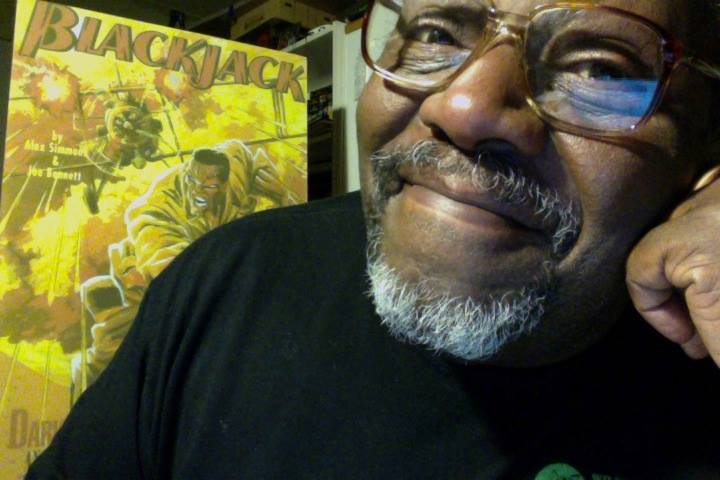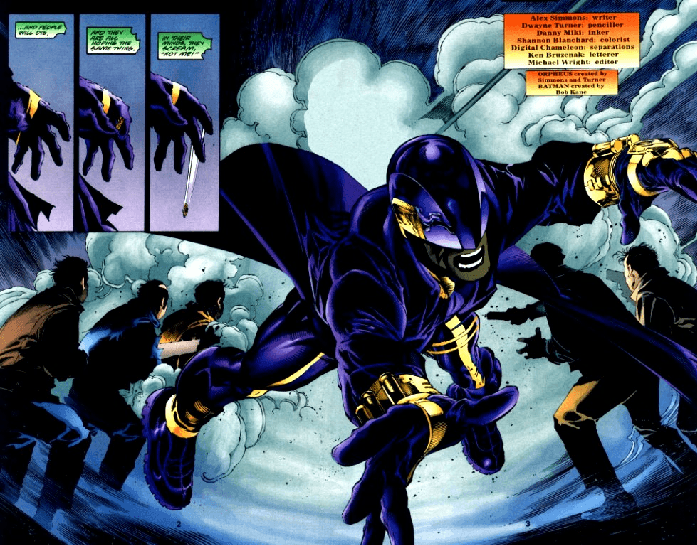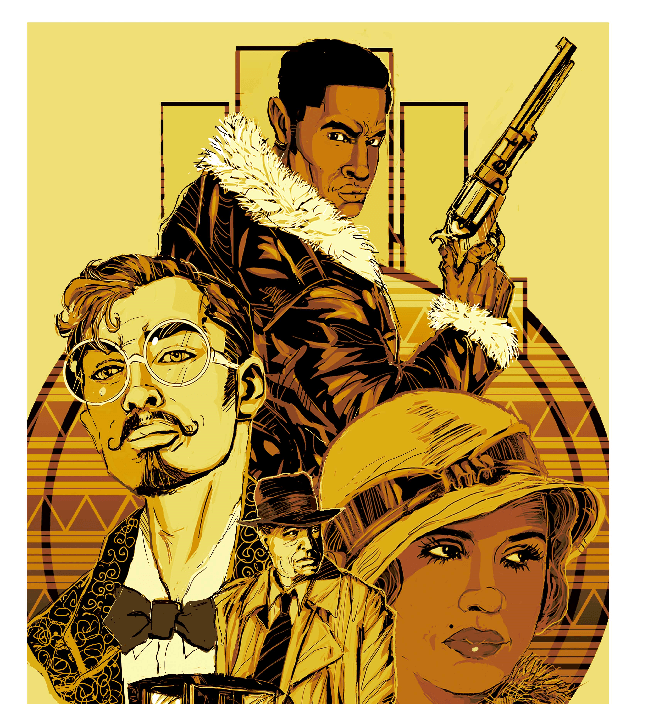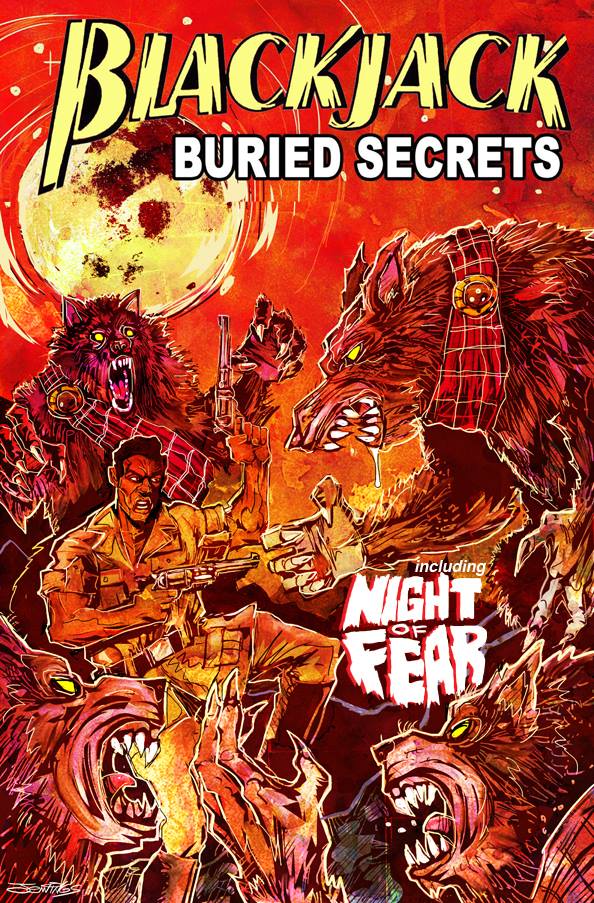I am forever indebted to writer Chris Ryan for introducing me to the works of Alex Simmons. I first came to see his work in the mini series BATMAN: ORPHEUS RISING. Simmons has a writing style that sets the reader in the heart of the genre be it noir, street level grit or action adventure. Simmons is well known for his own comic book creation BLACKJACK as well as contributing to Archie Comics, DC Comics and did we mention writing 3 novelizations for Disney and being a playwright? How about that he is also a guest speaker holding workshops geared toward teachers and children? Basically there ain’t nothing new under the galaxy for Alex Simmons folks. This interview is one we are high excited to have here on the site.
Black Nerd Problems: Mr. Simmons I thank you again for agreeing to do this interview. I know you ride hard for diversity in comic books as well as being a big contributor to the field of education through teaching. That being said lets jump right into it! Did you consider yourself a nerd growing up? If so, at what point in your life did you realize this about yourself and what was it that brought you to that realization?
Alex: Hahahahaha! Nerd had a slightly different meaning back then. It basically applied to one who wore horn-rim glasses, possibly with a piece of tape holding the middle together. You wore high water pants, were awkward around girls, and usually were a whiz in school. Possibly even teacher’s Pet.
I was only 2 out of 5.
Reading comics and liking animated TV shows and films was not considered weird. I grew up during the last great days of kid-centric programming. So I was just one of the kids.
As to when did I finally realize that I was a nerd … I never have. Its not a title that has any negative connotations for me, I’m just not one for grabbing at labels for myself. Spent too many years dealing with certain others that people wanted to apply. My oldest son once said it best, “I’m just me.”
BNP: I was first introduced to your work by my high school teacher Chris “Teacher of the Millennium” Ryan. He showed me the Batman mini-series you did called “Orpheus Rising”, where you introduced the character Orpheus into The DC Universe. I remember him telling me it was the first time Batman was written by a black writer. Can you tell us what it was that brought you into the comic book industry, (your origin story if you will)? Also please give us some insight about your process on developing the character Orpheus and the role you wanted for him in DC universe.
Alex: Glad to hear you think so much of Chris Ryan. He’s been a good friend, and he’s one the few people I know who is truly dedicated to teaching and quality education. Good to know his students get it.
As to my time with DC and creating Orpheus … First, I’m not sure I was the first black author to write Batman. There had certainly been black illustrators, so who knows? I was told that Orpheus was the first black hero created for the Batman Universe.
My entry into the comics industry was in two parts if you skip the fan boy experiences. Back in the day my friend Don McGregor worked for Marvel Comics. I was privileged to visit their offices on many occasions and meet Stan Lee, John Romita Sr., Marie Severen, Marv Wolfman, etc. As time progressed I also met Doug Moench, Archie Goodwin, Billy Graham (the comic artist, not the evangelist), to name a few more.
These names may not mean anything to some of your readers, but trust me these were the people to teach you the business. So by the time I started pitching for writing work in the business, I’d absorbed a lot. My first assignment was an original story of mine, “The Demon Chronicles,” in Eclipse Magazine (an indy publication). Then nothing until I created and pitched my Blackjack series. After a few near misses with DC Comics and Harris Comics, I decided to self publish.
That caught on (another story), which lead to DC Associate Editor, Joe Illidge, and Sr. Editor Denny O’Neal calling me in to create a black character for the Batman Universe. Which brings us back to your original question.
BNP: You have a character of your own that you have created called Black Jack, a soldier of fortune living in the 1930’s. This is a creation you’ve had for a while and have gotten critical acclaim with. What made you want to have a black character taking place in adventures set in the 1930’s, especially, when we don’t see many people of color from that era in fiction?
Alex: Well, the first part of my answer is – because we don’t see many people of color from that era in fiction … except as servants and buffoons. Old films, comics, comic strips, history publications, etc., it’s as if the majority of us didn’t exist.
I grew up exposed to a lot of entertainment media and I had plenty of heroic role models, and most of them were white (except for Jay Silverheel who played Tonto on the Lone Ranger series). I liked the Charlie Chan films, but during their almost ten year run, he was never played by a Chinese actor. It wasn’t until my early teens that things changed a bit. A few black stars were leads and heroes in film and TV, and that was a rush. Then I became aware of the many real life African and Native American explorers, warrior, and inventors.
So there I was, a black kid who enjoyed mystery and adventure stories, but had seldom seen himself represented in those tales. By that time I’d become interested in acting and writing so, slowly, I began to create the missing pieces for myself, and then for an audience.
So in affect, Blackjack evolved out of personal broth that had been simmering for many, many years.
BNP: When Mr. Ryan told me about your work he forgot to mention that you are a jack-of-all trades. Not only do you have your pen game in the comic book industry but you also do guest speaking, hold workshops, various work in education, I’m going to assume fighting crime, as well as being a co-founder and curator for Color of Comics art exhibition as well as being a founder and co-producer Kid’s Comic-Con. Please tell us more about these events and how you got involved with starting them up.
Alex: I guess we have to take that in the order that they developed. In my early twenties I began doing a lot of theater (children’s, Off-Off, and conflict resolution). I was studying acting and performing and the experiences were mounting. At some point some of the parents of young actors asked me to teach acting workshops to their kids. That led to me developing basic acting workshops, and as my career in the arts grew, so did my workshop repertoire.
Conflict Resolution Theater was often performed in schools or other educational facilities. In one high school assembly some of the students were so out of control that they disabled some of our tech just before the end of the show. We were lead off the stage and a school administrator told the students how disappointed he was in their behavior, and how they’d embarrassed the school.
I was upset because my character, the leader of a street gang had manipulated his own into a fight that got some of them injured and my gang lieutenant’s little sister killed. The play had stopped and that made it look like I got over. I kept saying that someone should go out and talk to the students, to let them know how the story really ended, and what a low life my character really was. I kept insisting, not realizing that the “someone” was going to be me.
I didn’t know what I was going to say. But I spoke from the heart and they listened. A week later when a few of the cast members returned to speak with a couple of the classes, I found out that what I said mattered to some of the students. So … I guess that was the beginning of my life of speaking to young people.
Since I look ridiculous in spandex I leave fighting crime – in the literal sense – to more athletic individuals.
The Kids Comic Con came out of my love for, and my work in, comics. As a child and teen, I knew how my friends and I voraciously read the books (literacy), how our vocabularies were unconsciously increased by the words and concepts in some of the series. How our communications and debating skills developed as we discussed and challenged the credibility of certain stories, art, and powers. And in my professional experience I was aware how the industry was moving completely away from its young audience in favor of more titillating, violent, and complex tales.
I have no problem with tiers of entertainment. I just didn’t – and still don’t – believe that kids must get tossed out the window to make room for adults. There are enough of us who believe that and thus still make material and events for our young and teen audiences.
So in 2007, Eugene Adams of Bronx Community College afforded me an opportunity to do a kids and family oriented comic con on the BCC campus. It was to be a one-time thing – simply to show the promoters with deep pockets that it was a worthwhile event to add to their venue. But it was so successful that attendees and pros alike insisted that we do it annually. So we have.
We’ve even created the KCC ROAD SHOW, a smaller version that in the US has taken us to other cons from Buffalo, to Washington, to Florida. And we’ve traveled to Senegal, Africa for one event, and we’re now developing projects with young people in Ireland and Holland.
Allow me a soapbox moment here. Large portions of our adult society have become jaded, disenfranchised, angry and frustrated with where we are in life. These attitudes are reflected in our entertainment, politics, and everyday life.
One of the casualties of this frame of mind is that we’ve stolen childhood from so many. There is less and less for kids specifically now. Less time, products, care, and promise. If we don’t believe in the future, how can they.
Sorry but the concept of constantly telling tales of post apocalyptic worlds, infested with death, sure isn’t uplifting to me. At least in the Star Trek movies, humankind made it.
My favorite superhero movie in the past 2 years has been Captain America: Winter Soldier. Cap and Falcon are my modern day Lone Ranger and Tonto. Cap embodies what the Ranger believed and fought for. Like Tonto, the Falcon is the partner carrying his own weight, fighting just as hard.
I feel most strongly that we need to restore hope and vision for a future filled with positive opportunities and goals. Otherwise, all we are offering ourselves and our children is a bleak and dismal tomorrow.
That’s not what I was put here for. That’s not what I want to leave either my own children nor any others that come after us.
BNP: Mr. Simmons I want to thank you for participating in this interview once again and will close out with the most important request. Please inform us of where we can find more of your work including what current projects you are working on or have coming up.
Alex: Saturday, 9/27th: I will be leading the Comics 2 Cartoons 2 Games workshop at the Wildcat Comic Con on the Penn College Campus, from 1:00-2:15 p.m., CAL 108. Oct. 9-12, I’ll also be at the New York Comic Con, appearing on two comics and education panels; signing my Blackjack and Archie comics, and leading a Sci-Tech Heroes workshop (See the NYCC schedule for times and places). I’ll also be debuting my new retro-pulp anthology, “Blackjack Buried Secrets,” at both events!
Does that give you enough, Mr. Town Cryer?
BNP: *after googling Town Cryer*
Yes, Once again Thank you for being you good sir!






Show Comments